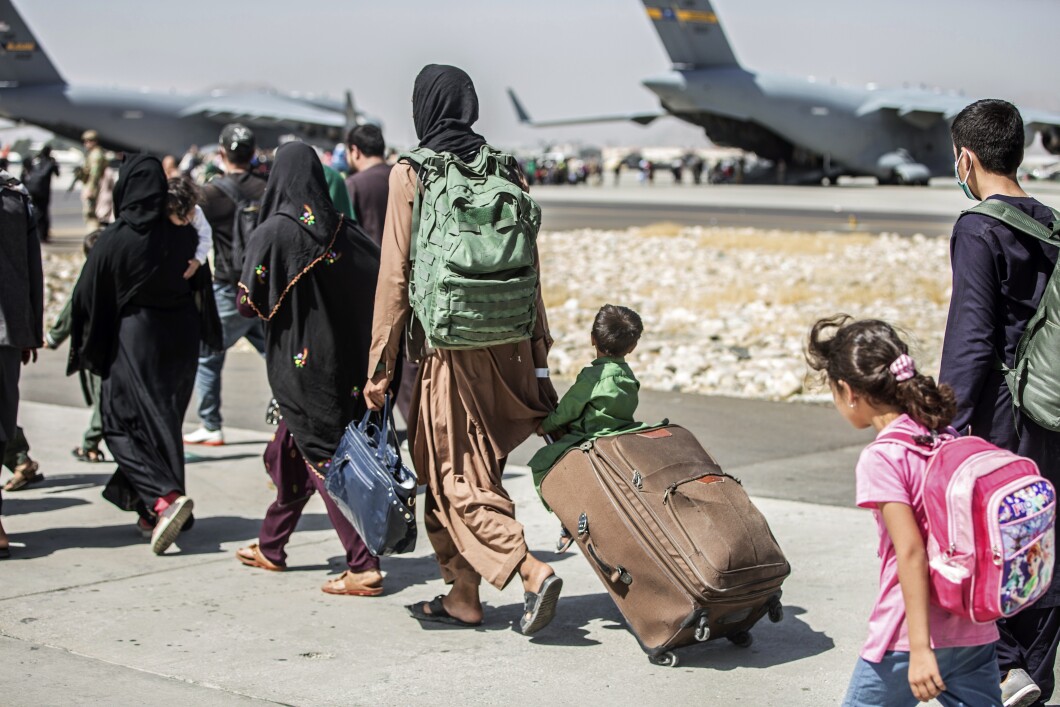
People long thought of the 2001-2021 Afghanistan conflict as “the good war.” U.S. military action in the landlocked central Asian conservative Muslim nation was a direct response to the 9/11 attacks, which claimed nearly 3,000 lives on American soil.
The public largely saw the Afghanistan war as a matter of self-defense since its Taliban government had allowed al Qaeda terrorists to train there and use the country as a base from which to plan the Sept. 11 attacks. Though more than 2,400 Americans died in military efforts fighting terrorists in Afghanistan, its moral authority shone brightly compared to the invasion of Iraq and subsequent war, a conflict of choice, which, according to critics, stood as the worst U.S. foreign policy decision of the modern era after it empowered neighboring Shia Mulsim majority Iran and more broadly destabilized the Middle East.
THE TRUTH ABOUT BIDEN’S UKRAINE FOREIGN POLICY
What the American public wasn’t counting on, though, was a chaotic and deadly withdrawal process by American and allied troops, one that harkened back to the U.S. loss in Vietnam, with American helicopters in April 1975 ignominiously taking off from the roof of their country’s embassy just before communist troops rolled in.
Worst of all, congressional Republicans said in late summer 2021, problems that plagued the Afghanistan withdrawal were likely foreseeable by President Joe Biden and his military and diplomatic advisers. So, since House Republicans in November won a narrow 222-213 majority, its leaders have been chomping at the bit to investigate the U.S. military’s Afghanistan withdrawal.
But GOP lawmakers are finding that simply blaming the Biden administration for the seemingly botched withdrawal isn’t so easy, as they’ve had mixed luck obtaining documents and other materials from the Biden administration. The narrative of the Afghanistan troop withdrawal being Biden’s fault isn’t as simple as they’d make it seem since Biden’s Republican predecessor, former President Donald Trump, laid much of the military and diplomatic groundwork that led to the chaotic withdrawal, completed on Aug. 30, 2021.
A Difficult Investigation
House Republicans have said they want to focus largely on the disastrous end to the war. One main question is how the Taliban’s August 2021 offensive easily toppled the U.S.-backed Afghan government despite the Afghan forces having been the recipients of billions of dollars for training and aid since the United States launched operations there on Oct. 7, 2001, upon the orders of then-President George W. Bush.
In the end, Afghan soldiers effectively laid down their weapons. U.S. forces ultimately conducted a chaotic evacuation effort for U.S. citizens and Afghan allies who had worked with American troops and were at risk under the Taliban regime. Thousands of Afghan allies were left behind, and many remain there to this day, under threat as the security situation worsens.

As U.S. forces evacuated more than 120,000 civilians in the final two weeks of August after the Taliban took control, their efforts were marred by a pair of tragic events. On Aug. 26, an ISIS-K operative detonated a suicide vest killing 13 U.S. service members and roughly 170 civilians outside the gates of the airport where the evacuations were occurring. Then, on Aug. 29, U.S. forces launched a strike at what they believed to be another imminent threat to the personnel at the airport, but the target was wrongly identified. Ten civilians were killed, including multiple children, while none of them posed a threat to U.S. forces or those at the airport.
The Biden administration ending the Afghanistan War under such circumstances was an obvious target of GOP investigation once they took power. At the start of the new Congress in early January, the issue got tied to support of Rep. Kevin McCarthy‘s (R-CA) bid to be House speaker by incoming House Foreign Affairs Committee Chairman Michael McCaul (R-TX), Armed Services Committee Chairman Mike Rogers (R-AL), and House Permanent Select Committee on Intelligence lead Republican Mike Turner (R-OH). The trio released a statement in support of McCarthy, saying in part that the California Republican’s “Commitment to America agenda outlines … a plan to investigate the botched withdrawal from Afghanistan.”
McCarthy won the speaker’s gavel on the 15th ballot, in the wee hours of Saturday, Jan. 7, after three and a half days of voting. The Foreign Affairs Committee became the first panel to get its Afghanistan investigation off the ground and running. McCaul, the new chairman, sent a letter to Secretary of State Antony Blinken on Jan. 12 asking for a litany of documents related to the withdrawal. McCaul set a response deadline of Jan. 26, two weeks later.
The State Department met that deadline late on the night of Jan. 26, a House Foreign Affairs Committee majority staffer told the Washington Examiner, but not to the committee’s satisfaction.
“We indicated to the State [Department] that we understand we won’t get everything by the 26th, but expect a substantial initial production. They instead responded on the 26th with a meager 218-page production of documents that had already been FOIA’d — and were heavily redacted,” the staffer said, alluding to past Freedom of Information Act document requests. “They told us in our meeting on Jan. 19 that they would send us unredacted documents. Instead, there were extensive redactions.”
The State Department also claimed to the committee that they couldn’t begin compiling the documents until receiving a letter from the chairman, while the staff said they are not aware of any law that would bar the department from internally compiling the documents they knew he’d want because he wrote them as the ranking member.
The agency declined to detail its response to the GOP-led committee.
That kind of back-and-forth was expected once Republican-led House investigations got underway. Biden administration officials suggested what they deemed legitimate issues of public concern would warrant their response to GOP requests, while other requests, like those probing alleged misdeeds by presidential son Hunter Biden, might be ignored. Biden administration officials cited ignored subpoenas by figures from the administration of former President Donald Trump and even Republican House members themselves during the Jan. 6 committee investigation.
A State Department spokesperson directed the Washington Examiner to spokesman Ned Price’s recent comments on the topic: “On the various topics and regions of oversight, we are going to continue with the approach that we have exercised with the prior Congress, with the 117th Congress, with the 118th Congress. Congress has important functions: authorization function, appropriation function, and an oversight function.”
McCaul, whose 10-page letter included a long list of questions he wants answers to, is planning for public hearings on the Afghanistan withdrawal. The majority staffer called the investigation “a top priority for the committee.”
Nor is McCaul the only House committee chairman eager to bring the disastrous end of the Afghanistan War back into the public sphere.
House Oversight Chairman James Comer (R-KY) sent letters in December, before he took the committee gavel, requesting information and documents from Defense Secretary Lloyd Austin, Joint Chiefs of Staff Chairman Gen. Mark Milley, Blinken, national security adviser Jake Sullivan, Homeland Security Secretary Alejandro Majorkas, and U.S. Agency for International Development Administrator Samantha Powers.
“The Biden Administration’s botched Afghanistan withdrawal was a humanitarian and national security catastrophe,” Comer told the Washington Examiner in a statement. “U.S. servicemen and women lost their lives, thousands of Americans were abandoned, billions of taxpayer dollars are still unaccounted for, military equipment fell into the hands of the Taliban, progress for Afghan women has stalled, and the entire region is now under hostile Taliban control. Nearly two years later, the American people are still without answers and sitting in the dark.”
Comer spokesman Austin Hacker told the Washington Examiner that no Biden administration officials have responded to the requests.
Trump Administration Responsibility?
While the end of the war did not go as Joe Biden intended, the situation was more complicated, having bedeviled four presidential administrations. The Special Inspector General for Afghanistan Reconstruction found that the Trump administration’s agreement with the Taliban in February 2020 to leave within 14 months put the Biden administration in the position of having to uphold it.
That was a “catalyst” and the “single most important near-term factor” in the Afghan military’s collapse, in part because it led to a drop in morale, a SIGAR report from last May lays out.
Anthony H. Cordesman, the emeritus chair in strategy at the Center for Strategic and International Studies, said the best way to learn from the mistakes in the war is to look much further back than just how it ended.
“One of the key issues is, does the committee basically focus on trying to blame the [Biden] administration for the near chaos of the worst phase of the collapse? Or does it look at the overall set of problems that led to the collapse? Historically, I think we can just focus on the most immediate crisis and never really look at the causes, and I think that if we do that again, it simply will not provide any clear guidance for the future,” Cordesman told the Washington Examiner.
Cordesman believes that to get a comprehensive understanding of the collapse of the Afghan government, the scope of the investigation should “certainly” go back to “at least 2015,” during the Obama administration, specifically on how the U.S. could have begun the peace process with a date certain — without “having any clear plan for peace or examination of how the sort of negotiating options would occur.”
Bradley Bowman, an expert at the Foundation for Defense of Democracies who was a defense adviser for former Sen. Kelly Ayotte (R-NH), thinks the national security implications from the withdrawal are too important for committees to get dragged into partisan exercises.
“I get frustrated by Democrats who just want to put it all on Trump, and I get frustrated by Republicans who just want to put it on Biden because I think neither of those approaches is fact-based or accurate. It’s just not,” Bowman told the Washington Examiner. “And I think the stakes that we confront and the threats that we confront as a country are just too serious for partisan gamesmanship, and I think on Afghanistan and everything else, if we’re going to adopt the national security policies we need, we need more serious-minded folks who are more interested in securing our country then winning partisan points.”
CLICK HERE TO READ MORE FROM THE WASHINGTON EXAMINER
With the U.S. leaving Afghanistan, Joe Biden and defense officials have said their counterterrorism strategy in the region focuses largely on the U.S.’s over-the-horizon capabilities, or the ability to launch strikes without troops in the country, though it’s much harder to collect the necessary intelligence required for such an action without personnel there to gather it. In the roughly 18 months since forces withdrew, the U.S. has conducted one such strike, in July 2022, that successfully targeted Ayman al Zawahiri, the successor of Osama bin Laden in al Qaeda’s leadership.
Al Zawahiri’s presence in Kabul’s Shirpur neighborhood, where U.S. officials alleged Taliban leaders not only knew he was there but engaged in a cover-up in an attempt to his presence there, demonstrates the tenuous security situation in Afghanistan.







